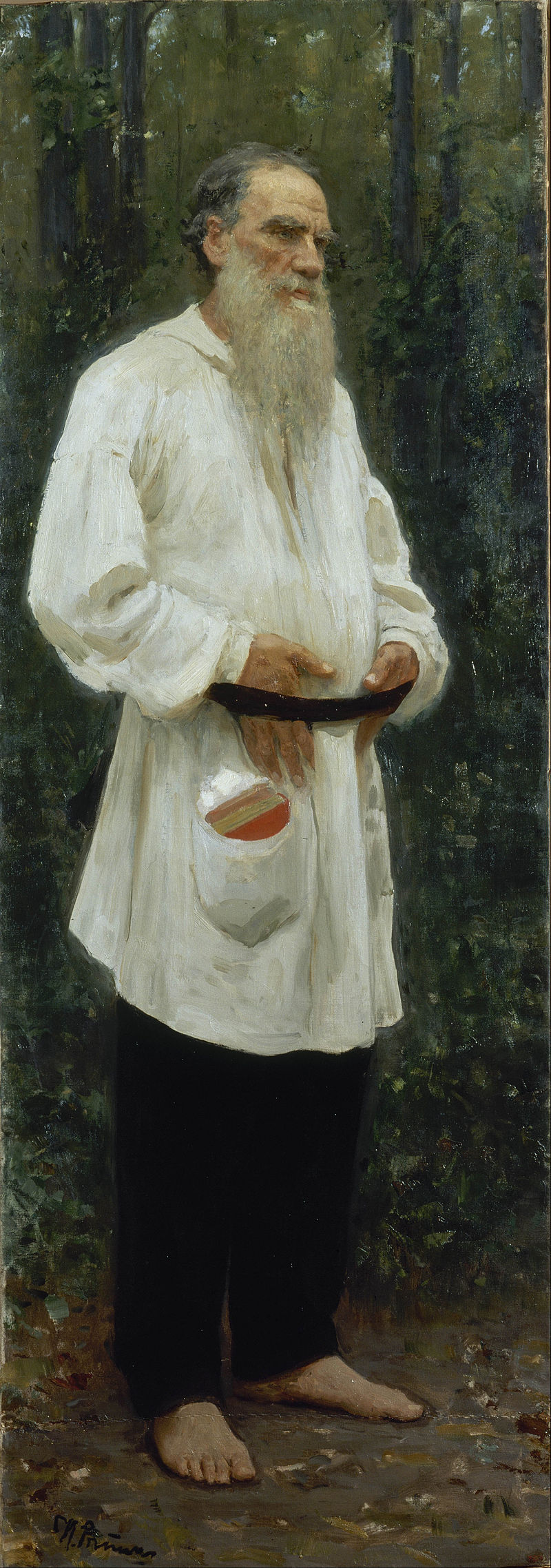Leo Tolstoy Archive
Written: 1888
Source: "Sevastopol," by Leo Tolstoy, translated by Isabel F. Hapgood, Published by Thomas Y. Crowell Co., 13 Astor Place
Transcription/Markup: Andy Carloff
Online Source: RevoltLib.com; 2021

Prince Galtsin met more and more wounded men, in stretchers and on foot, supporting each other, and talking loudly.
“When they rushed up, brothers,” said one tall soldier, who had two guns on his shoulder, in a bass voice, “when they rushed up and shouted, ‘Allah, Allah!’[G] they pressed each other on. You kill one, and another takes his place—you can do nothing. You never saw such numbers as there were of them....”
But at this point in his story Galtsin interrupted him.
“You come from the bastion?”
“Just so, Your Honor!”
“Well, what has been going on there? Tell me.”
“Why, what has been going on? They attacked in force, Your Honor; they climbed over the wall, and that's the end of it. They conquered completely, Your Honor.”
“How conquered? You repulsed them, surely?”
“How could we repulse them, when he came up with his whole force? They killed all our men, and there was no help given us.”
The soldier was mistaken, for the trenches were behind our forces; but this is a peculiar thing, which any one may observe: a soldier who has been wounded in an engagement always thinks that the day has been lost, and that the encounter has been a frightfully bloody one.
“Then, what did they mean by telling me that you had repulsed them?” said Galtsin, with irritation. “Perhaps the enemy was repulsed after you left? Is it long since you came away?”
“I have this instant come from there, Your Honor,” replied the soldier. “It is hardly possible. The trenches remained in his hands ... he won a complete victory.”
“Well, and are you not ashamed to have surrendered the trenches? This is horrible!” said Galtsin, angered by such indifference.
“What, when he was there in force?” growled the soldier.
“And, Your Honor,” said a soldier on a stretcher, who had just come up with them, “how could we help surrendering, when nearly all of us had been killed? If we had been in force, we would only have surrendered with our lives. But what was there to do? I ran one man through, and then I was struck.... O-oh! softly, brothers! steady, brothers! go more steadily!... O-oh!” groaned the wounded man.
“There really seem to be a great many extra men coming this way,” said Galtsin, again stopping the tall soldier with the two rifles. “Why are you walking off? Hey there, halt!”
The soldier halted, and removed his cap with his left hand.
“Where are you going, and why?” he shouted at him sternly. “He ...”
But, approaching the soldier very closely at that moment, he perceived that the latter's right arm was bandaged, and covered with blood far above the elbow.
“I am wounded, Your Honor!”
“Wounded? how?”
“It must have been a bullet, here!” said the soldier, pointing at his arm, “but I cannot tell yet. My head has been broken by something,” and, bending over, he showed the hair upon the back of it all clotted together with blood.
“And whose gun is that second one you have?”
“A choice French one, Your Honor! I captured it. And I should not have come away if it had not been to accompany this soldier; he might fall down,” he added, pointing at the soldier, who was walking a little in front, leaning upon his gun, and dragging his left foot heavily after him.
Prince Galtsin all at once became frightfully ashamed of his unjust suspicions. He felt that he was growing crimson, and turned away, without questioning the wounded men further, and, without looking after them, he went to the place where the injured men were being cared for.
Having forced his way with difficulty to the porch, through the wounded men who had come on foot, and the stretcher-bearers, who were entering with the wounded and emerging with the dead, Galtsin entered the first room, glanced round, and involuntarily turned back, and immediately ran into the street. It was too terrible.